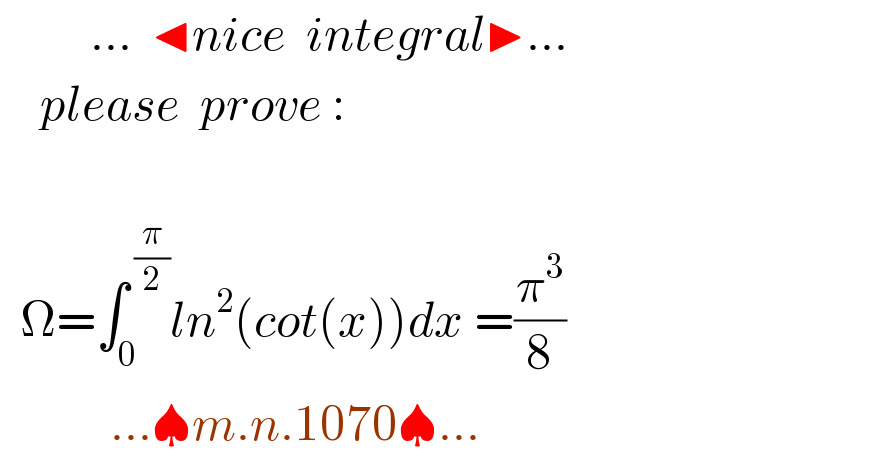Question Number 117953 by mnjuly1970 last updated on 14/Oct/20

Answered by mindispower last updated on 14/Oct/20
![Ω=∫_0 ^(π/2) ln^2 (cot(x))dx;cot(x)=s⇒ Ω=∫_0 ^∞ ((ln^2 (s))/(1+s^2 ))ds=2∫_0 ^1 ((ln^2 (s))/(1+s^2 ))ds=2∫_0 ^1 Σ(−s^2 )^k ln^2 (s)ds =2Σ_(n≥0) (−1)^n ∫_0 ^1 s^(2k) ln^2 (s)ds ∫_0 ^1 s^n ln^2 (s)ds=−(2/(n+1))∫_0 ^1 s^n ln(s)ds =(2/((n+1)^2 )) ∫_0 ^1 s^n ds=(2/((n+1)^3 )) we get Σ_(n≥0) ((4(−1)^n )/((2n+1)^3 ))=Σ_(n≥0) (4/((4n+1)^3 ))−Σ_(n≥0) (4/((4n+3)^3 )) =(1/(16))[Σ_(n≥0) (1/((n+(1/4))^3 ))−Σ_(n≥0) (1/((n+(3/4))^3 ))] =(1/(16))[Ψ^3 ((1/4))−Ψ^3 ((3/4))] Ψ(1−x)−Ψ(x)=πcot(πx) ⇒Ψ^3 (1−x)−Ψ^3 (x)=(d^2 /dx^2 )(πcot(πx)) =(d/dx)(−π^2 (1+cot^2 (πx))=2π^3 (1+cot^2 (πx))cot(πx)) (1/(16))[Ψ^3 ((1/4))−Ψ^3 ((3/4))]=(1/(16))(2π^3 (1+cot^2 ((π/4)))cot((π/4)) =(π^3 /4) may bee forget somthing](https://www.tinkutara.com/question/Q117996.png)
Commented by mnjuly1970 last updated on 14/Oct/20

Commented by mindispower last updated on 19/Oct/20

Answered by mathmax by abdo last updated on 14/Oct/20
![A =∫_0 ^(π/2) ln^2 (cotanx)dx ⇒ A =∫_0 ^(π/2) ln^2 ((1/(tanx)))dx =∫_0 ^(π/2) ln^2 (tanx)dx =_(tanx=t) ∫_0 ^∞ ((ln^2 (t))/(1+t^2 ))dt =∫_0 ^1 ((ln^2 t)/(1+t^2 ))dt +∫_1 ^∞ ((ln^2 t)/(1+t^2 ))dt(→t=(1/u)) =∫_0 ^1 ((ln^2 t)/(1+t^2 ))dt +∫_0 ^1 ((ln^2 u)/((1+(1/u^2 ))))(du/u^2 ) =2∫_0 ^1 ((ln^2 x)/(1+x^2 ))dx =2 ∫_0 ^1 ln^2 x(Σ_(n=0) ^∞ (−1)^n x^(2n) )dx =2 Σ_(n=0) ^∞ (−1)^n ∫_0 ^1 x^(2n) ln^2 x dx =2Σ_(n=0) ^∞ (−1)^n A_n by parts A_n =∫_0 ^1 x^(2n) ln^2 xdx =[(x^(2n+1) /(2n+1))ln^2 x]_0 ^1 −∫_0 ^1 (x^(2n+1) /(2n+1))((2lnx)/x)dx =−(2/((2n+1)))∫_0 ^1 x^(2n) lnx dx =−(2/((2n+1))){ [(x^(2n+1) /(2n+1))lnx]_0 ^1 −∫_0 ^1 (x^(2n) /(2n+1))} =(2/((2n+1)^3 )) ⇒ A =4 Σ_(n=0) ^∞ (((−1)^n )/((2n+1)^3 )) rest to find the value of this serie by sir fourier...be continued....](https://www.tinkutara.com/question/Q118046.png)
Commented by mnjuly1970 last updated on 15/Oct/20

